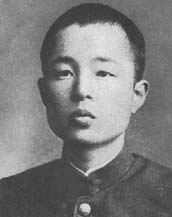Jūkichi Yagi facts for kids
Quick facts for kids
Jūkichi Yagi
|
|
|---|---|

Jūkichi Yagi
|
|
| Born | 八木 重吉 9 February 1898 Machida, Tokyo, Japan |
| Died | 26 October 1927 (aged 29) Chigasaki, Kanagawa, Japan |
| Resting place | Yagi family cemetery, Machida, Tokyo |
| Occupation | schoolteacher |
| Genre | religious poetry |
Jūkichi Yagi (born February 9, 1898 – died October 26, 1927) was a Japanese poet. He lived during the late Taishō and early Shōwa periods in Japan. Yagi was known for his poems that explored modern religious ideas.
Contents
The Life of Poet Jūkichi Yagi
Early Life and Faith
Jūkichi Yagi was born near Tokyo, in an area now called Machida. He went to the Kanagawa Prefectural Normal School. This school was located in Kamakura, Kanagawa, in Kanagawa Prefecture.
While at school, Yagi became a Christian. He joined the Methodist church. He was also very inspired by the poems of Rabindranath Tagore. In 1919, Yagi was baptized at a church in Tokyo. He remained a strong Protestant his whole life. Later, he joined the Non-Church Christianity movement. This idea was supported by Uchimura Kanzō.
Becoming a Poet
After finishing school, Yagi became a teacher. He taught at the Mikage Normal School in Hyōgo Prefecture. It was there that he started writing poetry. He used his poems to express his deep religious faith.
Yagi was greatly inspired by the English poet John Keats. He even wrote some of his own poems for Keats. In 1925, Yagi published his first collection of poems. It was called Aki no Hitome, which means Autumn Eye. He also sent some of his poems to magazines. However, he was a shy person and did not like to join literary groups.
Later Years and Legacy
In 1926, Yagi became very ill with tuberculosis. He was hospitalized in Chigasaki, Kanagawa. He sadly passed away on October 26, 1927.
Jūkichi Yagi became widely known only after his death. Several of his poetry collections were published then. These included Mazushiki Shinto (Humble Believer), Yagi Jukichi Shishu (Yagi Jukichi Anthology), and Kami O Yobu (Talk to God). These books helped people discover his beautiful and thoughtful poems.
See also
- Japanese literature
- List of Japanese authors
 | Jewel Prestage |
 | Ella Baker |
 | Fannie Lou Hamer |

